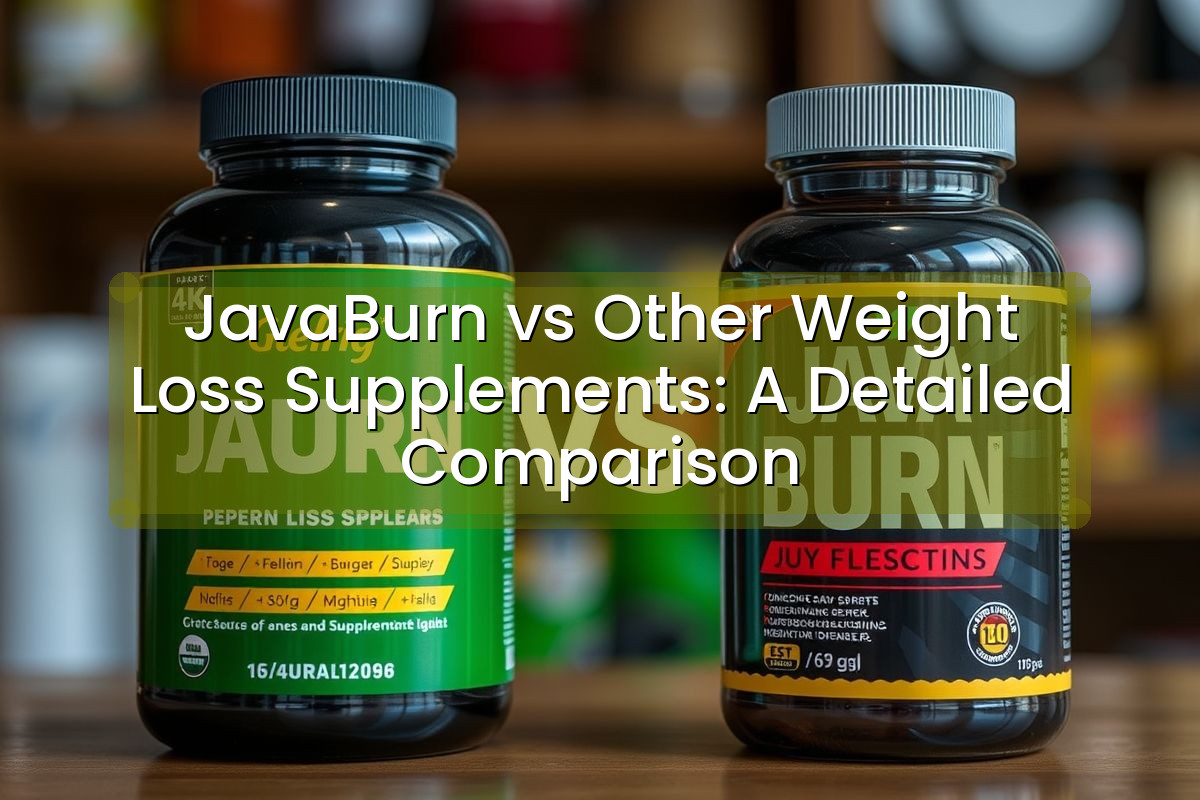JavaBurn vs. Other Weight Loss Supplements: A Detailed Comparison

The weight loss industry is a vast and ever-evolving landscape, filled with promises of quick fixes and miraculous transformations. Among the myriad of options available, JavaBurn has emerged as a popular contender, claiming to boost metabolism and facilitate weight loss through a unique blend of natural ingredients. But how does JavaBurn truly stack up against other weight loss supplements on the market? This detailed comparison will delve into the ingredients, mechanisms, effectiveness, and potential side effects of JavaBurn, providing an objective assessment to help you make an informed decision about your weight loss journey. We’ll explore the common ingredients found in other supplements, analyze their purported benefits, and contrast them with JavaBurn’s specific formulation to determine its potential advantages and disadvantages. Ultimately, our goal is to provide a comprehensive overview that empowers you to choose the weight loss solution that best aligns with your individual needs and health goals.
Understanding JavaBurn
What is JavaBurn?
JavaBurn is a powdered dietary supplement designed to be mixed with coffee. Its creators claim that it can accelerate metabolism and promote weight loss without requiring significant changes in diet or exercise. The formula is based on the premise that combining specific nutrients with coffee can create a synergistic effect, enhancing its fat-burning properties. JavaBurn’s appeal lies in its simplicity: simply add a packet to your daily coffee and purportedly experience increased energy levels, reduced appetite, and ultimately, weight loss. However, it’s crucial to examine the scientific basis behind these claims and understand the individual components of the supplement to determine its true effectiveness. This involves dissecting the ingredients list, analyzing their known effects on metabolism and weight management, and comparing them to the existing body of research on similar supplements.
At its core, JavaBurn relies on a blend of ingredients that are believed to influence various aspects of weight management. These include green tea extract, L-Carnitine, chromium, and chlorogenic acid. Green tea extract, a well-known antioxidant, is often associated with increased fat oxidation. L-Carnitine is an amino acid that plays a role in transporting fatty acids into the mitochondria, where they can be burned for energy. Chromium is a trace mineral that may help regulate blood sugar levels and reduce cravings. Chlorogenic acid, found in green coffee beans, is believed to inhibit the absorption of carbohydrates. Together, these ingredients are purported to work synergistically to promote weight loss, but the extent of their individual and combined effects remains a subject of ongoing research and debate. It’s essential to consider the dosage of each ingredient in JavaBurn and compare it to the amounts used in clinical studies to assess the likelihood of achieving the claimed benefits.
While JavaBurn’s marketing materials emphasize its ease of use and rapid results, it’s important to approach these claims with a critical eye. Weight loss is a complex process influenced by a multitude of factors, including genetics, diet, exercise, sleep, and stress levels. No single supplement can magically erase the need for a healthy lifestyle. Therefore, it’s crucial to view JavaBurn as a potential tool to complement a comprehensive weight management plan, rather than a standalone solution. Furthermore, it’s essential to consult with a healthcare professional before starting any new supplement regimen, especially if you have underlying health conditions or are taking medications. They can help you assess the potential risks and benefits of JavaBurn in your individual circumstances and provide personalized guidance on achieving your weight loss goals.
Key Ingredients in JavaBurn
JavaBurn boasts a unique blend of ingredients that are purportedly designed to work synergistically with coffee to boost metabolism and promote weight loss. Understanding each ingredient’s role and scientific backing is crucial in evaluating the supplement’s potential effectiveness. Let’s delve into the key components of JavaBurn:
Green Tea Extract: This extract is rich in antioxidants, particularly epigallocatechin gallate (EGCG), which has been linked to increased fat oxidation and thermogenesis (the process of heat production in the body). Studies suggest that EGCG may help boost metabolism and promote weight loss when combined with caffeine. However, the effectiveness of green tea extract can vary depending on the dosage and individual factors. The amount of green tea extract in JavaBurn should be considered in relation to the dosages used in clinical trials to determine its potential impact.
L-Carnitine: This amino acid plays a vital role in transporting fatty acids into the mitochondria, the powerhouses of cells, where they can be burned for energy. L-Carnitine supplementation is often touted as a way to enhance fat burning during exercise. While some studies have shown positive results, the effects of L-Carnitine on weight loss are not consistently observed across all individuals. The effectiveness of L-Carnitine may depend on factors such as dosage, individual metabolism, and exercise habits. It’s essential to consider whether the L-Carnitine content in JavaBurn is sufficient to produce noticeable results.
Chromium: This trace mineral is believed to help regulate blood sugar levels and reduce cravings. Chromium is often marketed as a weight loss aid due to its potential to improve insulin sensitivity and control appetite. However, the evidence supporting chromium’s effectiveness for weight loss is mixed. Some studies have shown modest benefits, while others have found no significant effect. The impact of chromium on weight management may depend on individual factors such as insulin resistance and dietary habits. It’s important to manage expectations regarding chromium’s potential to significantly impact weight loss.
Chlorogenic Acid: Found in green coffee beans, chlorogenic acid is believed to inhibit the absorption of carbohydrates and reduce blood sugar levels. Some studies suggest that chlorogenic acid may promote weight loss by reducing the amount of sugar absorbed from food. However, the effectiveness of chlorogenic acid can vary depending on the source, dosage, and individual metabolism. Furthermore, the roasting process can reduce the chlorogenic acid content in coffee beans, so it’s essential to ensure that JavaBurn uses a source of chlorogenic acid that is effectively preserved.
Common Ingredients in Other Weight Loss Supplements
Popular Ingredients and Their Claims
The weight loss supplement market is flooded with products containing a wide array of ingredients, each promising to help individuals shed pounds and achieve their desired physique. While some ingredients have scientific backing, others are based on anecdotal evidence or marketing hype. Understanding the common ingredients found in other weight loss supplements and their purported benefits is crucial for making informed decisions. Here are some of the most popular ingredients and their associated claims:
Garcinia Cambogia: This tropical fruit extract contains hydroxycitric acid (HCA), which is believed to block the enzyme citrate lyase, which the body uses to make fat. It is also claimed to increase serotonin levels, potentially suppressing appetite. While some studies initially showed promise, more recent and comprehensive research has yielded mixed results, with many studies failing to demonstrate significant weight loss benefits. Garcinia Cambogia’s effectiveness may vary depending on the dosage, the quality of the extract, and individual factors.
Raspberry Ketones: These compounds are naturally found in raspberries and are claimed to increase fat breakdown and promote weight loss. Some studies in test tubes and animals have shown that raspberry ketones can increase lipolysis (the breakdown of fat) and increase the levels of adiponectin, a hormone linked to weight loss. However, there is limited evidence to support these claims in humans, and more research is needed to determine the effectiveness and safety of raspberry ketones for weight loss.
Glucomannan: This dietary fiber is derived from the konjac root and is known for its ability to absorb water and expand in the stomach, promoting feelings of fullness and potentially reducing calorie intake. Glucomannan has been shown in some studies to promote modest weight loss when combined with a healthy diet and exercise. However, it’s important to note that glucomannan can cause digestive discomfort in some individuals, such as bloating and gas.
Caffeine: A stimulant found in coffee, tea, and other beverages, caffeine is known to increase metabolism and fat burning. It can also enhance energy levels and improve focus, which may indirectly support weight loss efforts. However, excessive caffeine intake can lead to side effects such as anxiety, insomnia, and heart palpitations. The optimal caffeine dosage for weight loss varies depending on individual tolerance and sensitivity.
Comparing Efficacy and Safety
When comparing the efficacy and safety of different weight loss supplement ingredients, it’s crucial to consider the scientific evidence supporting their claims. Some ingredients, such as caffeine and green tea extract, have a relatively strong body of research demonstrating their potential benefits for weight management. However, other ingredients, such as raspberry ketones and Garcinia Cambogia, have limited evidence to support their effectiveness in humans. It’s also important to be aware of potential side effects and interactions with other medications. For example, some weight loss supplements can interact with blood thinners or medications for diabetes. Consulting with a healthcare professional before starting any new supplement regimen is essential to ensure safety and minimize the risk of adverse effects.
Furthermore, it’s important to be wary of exaggerated claims and marketing hype. The weight loss supplement industry is often characterized by misleading advertising and unsubstantiated promises. Look for supplements that have been tested by third-party organizations and that provide clear and transparent information about their ingredients and dosages. Avoid products that make unrealistic claims or promise rapid weight loss without any effort. A healthy and sustainable approach to weight loss involves a combination of a balanced diet, regular exercise, and lifestyle modifications. Weight loss supplements can be a potential tool to complement these efforts, but they should not be considered a magic bullet.
| Ingredient | JavaBurn | Other Supplements | Potential Benefits | Potential Risks |
|---|---|---|---|---|
| Green Tea Extract | Yes | Yes | Increased fat oxidation, boosted metabolism | Anxiety, insomnia |
| L-Carnitine | Yes | Yes | Improved fat transport, enhanced energy | Nausea, stomach upset |
| Chromium | Yes | Yes | Regulated blood sugar, reduced cravings | Headaches, insomnia |
| Chlorogenic Acid | Yes | Yes | Reduced carbohydrate absorption | Stomach upset |
| Garcinia Cambogia | No | Yes | Appetite suppression (limited evidence) | Liver problems, digestive issues |
| Raspberry Ketones | No | Yes | Increased fat breakdown (limited evidence) | Unknown (limited research) |
| Glucomannan | No | Yes | Increased satiety, reduced calorie intake | Bloating, gas |
JavaBurn’s Unique Approach
Synergistic Effects with Coffee
JavaBurn’s unique selling proposition lies in its purported ability to synergistically enhance the weight loss benefits of coffee. The supplement is designed to be mixed with coffee, and its creators claim that the combination of specific nutrients and caffeine can create a more potent effect than either substance alone. The idea behind this approach is that coffee, with its caffeine content, can stimulate metabolism and increase fat burning. By adding JavaBurn’s blend of ingredients, such as green tea extract, L-Carnitine, and chromium, the supplement aims to further amplify these effects and promote more significant weight loss results. However, it’s crucial to examine the scientific basis for these claims and determine whether the synergistic effect is truly supported by evidence.
One potential mechanism for the synergistic effect is the interaction between caffeine and green tea extract. Caffeine is known to increase metabolism and fat oxidation, while green tea extract contains antioxidants, particularly EGCG, that have also been linked to these effects. When combined, caffeine and EGCG may work together to further stimulate metabolism and promote fat burning. Additionally, the combination of caffeine and L-Carnitine may enhance the transport of fatty acids into the mitochondria, where they can be burned for energy. However, it’s important to note that the extent of these synergistic effects can vary depending on individual factors such as genetics, caffeine sensitivity, and dietary habits. Furthermore, the dosage of each ingredient in JavaBurn and the timing of consumption relative to coffee intake may also influence the overall effect.
While JavaBurn’s approach of combining nutrients with coffee is intriguing, it’s essential to approach these claims with a critical eye. The weight loss industry is often characterized by marketing hype and unsubstantiated promises. It’s important to look for scientific evidence supporting the synergistic effects of JavaBurn’s ingredients with coffee. Furthermore, it’s crucial to consider the potential risks and side effects associated with high caffeine intake. Excessive caffeine consumption can lead to anxiety, insomnia, heart palpitations, and other adverse effects. Individuals who are sensitive to caffeine or have underlying health conditions should exercise caution when using JavaBurn and consult with a healthcare professional before starting any new supplement regimen.
Potential Advantages and Disadvantages
JavaBurn, like any weight loss supplement, presents both potential advantages and disadvantages that individuals should carefully consider before incorporating it into their weight management plan. Understanding these aspects can help you make an informed decision and set realistic expectations.
Potential Advantages: One of the main advantages of JavaBurn is its ease of use. The supplement is designed to be mixed with coffee, making it a convenient addition to your daily routine. This can be particularly appealing for individuals who already consume coffee regularly. JavaBurn also contains a blend of ingredients that have been linked to weight loss, such as green tea extract, L-Carnitine, and chromium. While the effectiveness of these ingredients can vary, they may potentially contribute to increased metabolism, fat burning, and appetite control. Furthermore, JavaBurn’s focus on synergistically enhancing the weight loss benefits of coffee is a unique approach that may appeal to some individuals.
Potential Disadvantages: One of the main disadvantages of JavaBurn is the lack of conclusive scientific evidence supporting its effectiveness as a standalone weight loss solution. While some of its ingredients have been linked to weight loss, the overall impact of the supplement may be limited. Additionally, JavaBurn contains caffeine, which can cause side effects such as anxiety, insomnia, and heart palpitations in sensitive individuals. It’s also important to note that weight loss is a complex process influenced by a multitude of factors, including diet, exercise, sleep, and stress levels. JavaBurn should not be considered a magic bullet or a substitute for a healthy lifestyle. Finally, the cost of JavaBurn may be a barrier for some individuals, as it can be more expensive than other weight loss supplements.
Conclusion
Choosing the right weight loss supplement can be a daunting task, given the overwhelming number of options available. JavaBurn presents a unique approach by aiming to synergistically enhance the weight loss benefits of coffee through a blend of ingredients like green tea extract, L-Carnitine, and chromium. However, it’s crucial to approach JavaBurn, and any weight loss supplement, with a balanced perspective. While some ingredients may offer potential benefits, the overall impact can vary depending on individual factors and lifestyle choices. It is not a magical solution. Consider a healthy diet, regular exercise, and medical advice.
Frequently Asked Questions














Leave a Reply